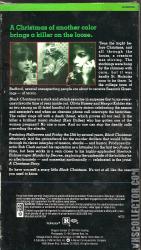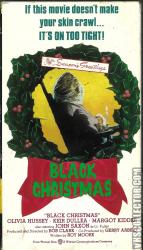Black Christmas
Catalog Number
11590
-
Primary Distributor (If not listed, select "OTHER")
Catalog Number
11590
Primary Distributor (If not listed, select "OTHER")
Release Year
Country
98 mins (NTSC)
N/A | N/A | N/A
N/A | N/A
Black Christmas (1974)
Additional Information
Additional Information
If this movie doesn't make your skin crawl... It's On Too Tight!
Christmas is coming early this year. And it's murder.
The sort of Christmas you don't dream of.
Although this Canadian production saw its widest U.S. cable TV distribution in the early '80s (primarily under the title Stranger in the House) to capitalize on the phenomenal success of Halloween and its offspring, this effective suspense-thriller actually predates John Carpenter's film by four years. The story involves a dangerous psychopath hiding out in the attic of a sorority house who torments a small group of pretty young sisters (including Olivia Hussey and Margot Kidder) who are staying behind over Christmas break. His tactics range from making obscene phone calls from their house-mother's phone, to stalking the terrified boarders with sharp objects and murderous intent. Director Bob Clark, who mistook dreariness for tension in his previous horror effort Children Shouldn't Play With Dead Things! (1972), here demonstrates a tight, aggressive style that generates some very original shocks -- particularly the surprise ending -- which clearly influenced dozens of similarly-themed slasher films to follow.
Black Christmas is a 1974 independent Canadian horror film directed by Bob Clark and written by A. Roy Moore. It stars Olivia Hussey, Keir Dullea, Margot Kidder, Andrea Martin, Marian Waldman and John Saxon.
The story follows college students who must face a deranged serial killer lurking in their sorority house. It was inspired by the urban legend of "The Babysitter and the Man Upstairs", but was also largely based on a series of murders that took place in Quebec, Canada around Christmas time.
Black Christmas is generally considered to be one of the first slasher films.[1]
A remake of the same name, produced by Clark, was released on 25 December 2006.
Black Christmas was officially released on October 11, 1974, in Canada through Ambassador Film Distributors, and in the United States on December 20, 1974, through Warner Bros.,[3] where it grossed $4,053,000. It was released in October 1975 in New York City and Chicago,[4] and previously played under the title Silent Night, Evil Night in Virginia in July 1975.[5] and grossed over $4,053,00 internationally, managing to earn more than the film's budget of $620,000.[citation needed] When released in the UK, the BBFC had the word "cunt" removed, as well as several other crude and sexual references during the first obscene phone call
Upon its release, the film garnered mixed to negative reception from contemporary critics. A writer for The New York Times scored the film a 1 out of 5, calling it "a whodunit that begs the question of why it was made."[6] Variety also gave the film a negative review, stating that the film was heavily clichéd and calling it "a bloody, senseless kill-for-kicks feature" that "exploits unnecessary violence", lending praise only to Marian Waldman as the secretly alcoholic sorority house mother.[7]
The film has since received generally positive reviews from modern critics. According to the review aggregator website Rotten Tomatoes, it has a 63% "fresh" score based on 24 reviews, with an average rating of 6.2 out of 10.[8] Heidi Martinuzzi of Film Threat called the film "innovative" and praised the leading actresses, Olivia Hussey and Margot Kidder.
The film eventually gained a cult following in the years. The film is notable for being one of the first slasher films and inspiring films such as Friday the 13th and John Carpenter's Halloween. The film ranked No. 87 on Bravo's The 100 Scariest Movie Moments.[citation needed] Actor Steve Martin met Olivia Hussey at the première of his movie Roxanne and he said she was in one of his favourite movies of all time. Hussey initially thought he was referring to Romeo and Juliet, but was surprised when Martin said it was Black Christmas, and that he had seen the film 27 times.
Release Date: October 25, 1975
Distrib: Warner Brothers
Christmas is coming early this year. And it's murder.
The sort of Christmas you don't dream of.
Although this Canadian production saw its widest U.S. cable TV distribution in the early '80s (primarily under the title Stranger in the House) to capitalize on the phenomenal success of Halloween and its offspring, this effective suspense-thriller actually predates John Carpenter's film by four years. The story involves a dangerous psychopath hiding out in the attic of a sorority house who torments a small group of pretty young sisters (including Olivia Hussey and Margot Kidder) who are staying behind over Christmas break. His tactics range from making obscene phone calls from their house-mother's phone, to stalking the terrified boarders with sharp objects and murderous intent. Director Bob Clark, who mistook dreariness for tension in his previous horror effort Children Shouldn't Play With Dead Things! (1972), here demonstrates a tight, aggressive style that generates some very original shocks -- particularly the surprise ending -- which clearly influenced dozens of similarly-themed slasher films to follow.
Black Christmas is a 1974 independent Canadian horror film directed by Bob Clark and written by A. Roy Moore. It stars Olivia Hussey, Keir Dullea, Margot Kidder, Andrea Martin, Marian Waldman and John Saxon.
The story follows college students who must face a deranged serial killer lurking in their sorority house. It was inspired by the urban legend of "The Babysitter and the Man Upstairs", but was also largely based on a series of murders that took place in Quebec, Canada around Christmas time.
Black Christmas is generally considered to be one of the first slasher films.[1]
A remake of the same name, produced by Clark, was released on 25 December 2006.
Black Christmas was officially released on October 11, 1974, in Canada through Ambassador Film Distributors, and in the United States on December 20, 1974, through Warner Bros.,[3] where it grossed $4,053,000. It was released in October 1975 in New York City and Chicago,[4] and previously played under the title Silent Night, Evil Night in Virginia in July 1975.[5] and grossed over $4,053,00 internationally, managing to earn more than the film's budget of $620,000.[citation needed] When released in the UK, the BBFC had the word "cunt" removed, as well as several other crude and sexual references during the first obscene phone call
Upon its release, the film garnered mixed to negative reception from contemporary critics. A writer for The New York Times scored the film a 1 out of 5, calling it "a whodunit that begs the question of why it was made."[6] Variety also gave the film a negative review, stating that the film was heavily clichéd and calling it "a bloody, senseless kill-for-kicks feature" that "exploits unnecessary violence", lending praise only to Marian Waldman as the secretly alcoholic sorority house mother.[7]
The film has since received generally positive reviews from modern critics. According to the review aggregator website Rotten Tomatoes, it has a 63% "fresh" score based on 24 reviews, with an average rating of 6.2 out of 10.[8] Heidi Martinuzzi of Film Threat called the film "innovative" and praised the leading actresses, Olivia Hussey and Margot Kidder.
The film eventually gained a cult following in the years. The film is notable for being one of the first slasher films and inspiring films such as Friday the 13th and John Carpenter's Halloween. The film ranked No. 87 on Bravo's The 100 Scariest Movie Moments.[citation needed] Actor Steve Martin met Olivia Hussey at the première of his movie Roxanne and he said she was in one of his favourite movies of all time. Hussey initially thought he was referring to Romeo and Juliet, but was surprised when Martin said it was Black Christmas, and that he had seen the film 27 times.
Release Date: October 25, 1975
Distrib: Warner Brothers
Related Links
Related Releases1
Catalog Number
90035
Primary Distributor (If not listed, select "OTHER")
Black Christmas (1974)
Release Year
Catalog Number
90035
Primary Distributor (If not listed, select "OTHER")
Catalog Number
90035










Comments0
Login / Register to post comments